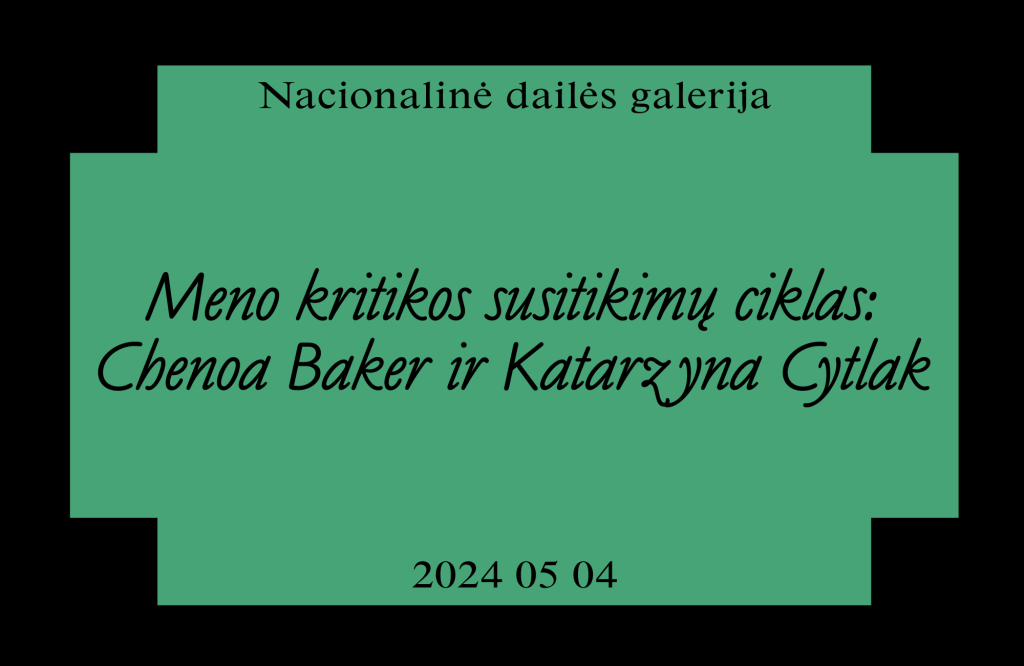
This year, the series of events organized in the context of the Visual Art Criticism Awards starts with a meeting with two art critics who are the two prize winners of the International Association of Art Critics (AICA) Incentive Prize for Young Art Critics 2023.
Chenoa Baker (Boston, USA) and Katarzyna Cytlak (Poznan, Poland) write in very different styles, for very distinct audiences, with very diverse approaches to their research, and ask different questions both of themselves and the artworks. However, it is precisely the differences that invite us to pay attention to the variety of critical challenges in today’s context. Art criticism is a mediator between content and context, reflecting, among other things, the tensions within the field of art, which is confronted with questions of history, politics, and the perception of art.
Curator, writer and cultural strategist Chenoa Baker won first prize in the AICA competition for her essay “Traveling Somewhere Warm in Our Minds: A Review of Presence in the Pause: Interiority and its Radical Immanence.” Her presentation “Relational Aesthetics in Criticism” invites us to take a behind-the-scenes look at her writing and thinking process of the award-winning piece. Despite the author’s skepticism towards exhibitions of figurative painting, the text reviews precisely such an exhibition. Baker will also look at her other writing projects, the psychological concepts behind that make relatable writing, and some examples of how human encounters with art are an important and often forgotten layer of meaning-making in criticism. She hopes that the talk is a generative, fun, and thought-provoking affirmation for the audience.
Baker teaches at Massachusetts College of Art and Design and previously was the Associate Curator at “ShowUp” art space. In addition, she has consulted on several exhibitions, such as Gio Swaby: Fresh Up at the Peabody Essex Museum and Touching Roots: Black Ancestral Legacies in the Americas at MFA/Boston. Her writing appears in Hyperallergic, Public Parking, Material Intelligence, and Studio Potter.
Katarzyna Cytlak is an art historian, her piece Condensing Vestiges of Past Futures in the Post-Peripheries: Artistic Engagement with Post-Colonial and Post- Authoritarian Contexts was awarded the second prize in the AICA competition. In her lecture of the same title, she will dive into the dynamics of archival and historiographic turn in contemporary art. According to her, this turn has been shaped by the realities of post-authoritarian, post-communist, and post-crisis contexts. Cytlak discusses artists of Uruguayan, Polish, Hungarian, Angolan, Iraqi and American originwhose work respond to post-authoritarian trauma, socio-political crisis, and a general state of ideological confusion characteristic of world regions placed between major centers of power. She is particularly interested in how these artists use images from popular culture to create historical meta-narratives of power and resistance. Her research draws on the insights of the German philosopher Reinhart Koselleck, the Cameroonian philosopher Achille Mbembe, and the Argentinean and Mexican sociologist Néstor García Canclini.
Cytlak’s research is focused on the art of Central and Latin America, often juxtaposing these regions with Eastern Europe. She teaches art criticism at the University of Toruń in Poland. She holds a PhD from the Sorbonne and has held fellowships at the National Council for Scientific and Technical Research (CONICET) in Argentina and the University of San Martin. Her articles have been published in Umění/Art, Eadem Utraque Europa, Telón de Fondo, Third Text, RIHA Journal and many other publications.
–
The Visual Art Criticism Awards and the accompanying events are organized by the Contemporary Art Centre, the LNMA National Gallery of Art and Artnews.lt. The series of events will continue with a meeting with curator and writer Raimundas Malašauskas, individual meetings with editors of cultural media (registration will be announced soon) and the 2024 Art Criticism Awards ceremony on the first of June.
The project is funded by the Lithuanian Council for Culture and Vilnius City Municipality.